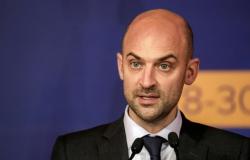He will be buried by a political family at the gates of power. Jean-Marie Le Pen, who died on Tuesday January 7 at the age of 96, will have long survived his ouster from the National Front by his own daughter, then the change of name of the party to which his destiny was closely linked. In French society as much as in the political world, because he was able – for a time – to rally to his flame the majority of the chapels of the extreme right, he leaves a poisonous legacy.
Born in 1928 in La Trinité-sur-Mer (Morbihan), Jean, Louis, Marie Le Pen was a “ward of the nation” in 1942, after the shipwreck of her father, a fisherman, on board a boat which struck a mine. First pitfall, first lie: the Le Pen family claims to have Jean’s name engraved on the village war memorial. “Death for France”?
According to the testimony of a sailor who survived the shipwreck, published in the chained duck in 1992 and corroborated in 1994 by the book Le Penby Gilles Bresson and Christian Lionet (Seuil), he benefited from an “ausweis” to supply Le Rouzic, a restaurant requisitioned by the Germans, and is said to have jumped on a French or English mine. Regardless, throughout his life, Le Pen would use this legend, and others that he had forged, in the service of his image as a morally and politically honest Frenchman. What his career in politics will deny.
Study of law and support for the colonial empire
After turbulent secondary studies, with a baccalaureate in hand, he entered the Paris law faculty in 1948, where he crossed paths with Action Française, and represented the “corpo” of law in the “big” Unef at the beginning of the 1950s. Very quickly, he opted for political action, without yet joining a party. After his studies (law degree and lawyer’s degree), he did six months of military preparation at the infantry application school of Saint-Maixent (Deux-Sèvres) before enlisting in Indochina. He arrived there in 1954, in the 1is foreign parachute battalion, at the rank of second lieutenant. Returning to France in 1955, he was elected president of the Young Independents of Paris. Then began a long political career in the various stables of the extreme right.
Le Pen began with the “sausage merchants” of Pierre Poujade’s Union for the Defense of Traders and Artisans (UDCA), who got him elected to the Palais-Bourbon in 1956 on the French Union and Fraternity (UFF) lists. He then adds his second name Marie to the first to “seduce the Catholic electorate”. Between 1956 and 1962, he navigated between the UDCA, the National and Civic Movement for Social Action, the UFF, founded the National Front of Combatants (dissolved in 1961), the National Front for French Algeria (also dissolved in 1960). A loyalty to the colonial empire never denied: in 1961, he applauded the OAS and the putschist General Salan in his meetings. He brandishes the standard of French Algeria to restore the patriotic image of a French extreme right which has wallowed in the collaborationist mire.
“Le Pen and Torture”
Already, in 1956, he had obtained from the National Assembly to return to his former unit, which had left Indochina for Algeria. His own words, transcribed by the Official Journal of June 12, 1957, send shivers down your spine: “I was an intelligence officer in Algiers. (…) As such I must be in the eyes of a certain number of my colleagues what could be the mixture of an SS officer and a Gestapo agent. I did this job. » The historian Fabrice Riceputi, who devoted an investigation into his past as a torturer in Algeria (Le Pen and Tortureeditions of Passager clandestine), has identified “several dozen victims of torture, but also of summary executions, during the two and a half months of (his) effective presence in Algiers”.
For a long time, Jean-Marie Le Pen played hide and seek with the truth about this period. Even in his memoirs published in February 2018, where he states that “yes, the French army practiced the question well to obtain information during the battle of Algiers”believing that “the means she used were as least violent as possible”. “It included the beatings, the gegene and the bathtub, but no mutilation, nothing affecting physical integrity”he plastered. Falsification of history – this will not be the only one: the German Occupation in France, according to him, was not “not particularly inhumane” – contradicted by numerous victims in court.
Anti-Semitic and homophobic
The former leader of the National Front was a regular in the courtrooms. His legal journey is marked by multiple expressions of hatred. In 1958, he questioned Pierre Mendès-France, guilty, he considered, of having ” Let it go ” France in Algeria: “Mr. Mendès France, you crystallize in your character a certain number of patriotic, almost physical repulsions. »
His first official anti-Semitic outburst will not be the last. Throughout his political life, he flirted with this obsession. The play on words “Durafour crematorium” in 1988, such as the reclassification of the gas chambers in the Nazi extermination camps in “detail of the story” the previous year (he will do it again in 1997, 2008 and 2009) or the “batch” to get rid of supposedly Jewish artists opposed to the FN (2014) earned him numerous summons to appear.
In March 2018, under the guise of indifference, it was his execration for homosexuals that he let pour out: “As long as homosexuals don’t put their hands in my fly or those of my grandchildren, and they don’t walk around with a feather up their ass on the Champs-Élysées, I don’t care »he belched in the gay magazine Friendly. Which earned him yet another appearance in court for this comparison between homosexuality and pedophilia. But of all the hatreds, the one he devoted to foreigners arriving or living in France consumed him more than any other. He made it the fight of a lifetime.
Nationalist and Poujadist
After breaking with Jean-Louis Tixier-Vignancour, lawyer and former head of information under Vichy with whom he participated in the 1965 presidential election, Jean-Marie Le Pen was dubbed by Ordre Nouveau to rebuild the extreme right and pull it out of the political marginality where it languishes. Its leaders hoped to treat him as an “electoral stooge” without decision-making power. They will disappear in favor of the family business that Le Pen will manage for 40 years.
An agglomerate of far-right groups which until now worked in parallel, the National Front, which it founded in 1972, made a synthesis, on the model of the Movimento sociale italiano (MSI, of which the FN adapted for its logo the tricolor flame), between the nationalist current that he represented, “composed mainly of students of Maurras culture” et “the Poujadist current and defense of French Algeria, more popular and provincial”wrote in 1997 the specialist of the extreme right Jean-Yves Camus in The National Front, history and analyzes (editions Laurens).
In the 1970s, the party was considered folkloric: it did not pose a danger – although Le Pen himself was targeted by an attack in 1976 and the party’s number two, François Duprat, was killed in the explosion of his car. Electorally at least: 2.3% in the legislative elections of 1973, 0.74% in the presidential elections of 1974, a few municipal councilors on RPR-UDF union lists in 1977. But an ideological corpus was forged around the immigration-triptych unemployment-insecurity. The FN crushes communism, “rejects the class struggle” to replace it with the struggle of « races » : “France and the French first” became its slogan in 1973.
Anticommunism and big money
Foreigners and communism become his two irreducible enemies, and his political struggle is structured around this adversity. In 1984, in the Hour of Truth, on Antenne 2, he achieved a media stunt by getting up, in the middle of a broadcast, to observe a minute of silence “in memory of the tens of millions of men who fell throughout the world under the communist dictatorship”. In 1980, he did not hide his Atlanticism and his admiration for Ronald Reagan, a fierce anti-communist whose ultraliberal positions he espoused. Again in 2002, on the evening of his success in the first round of the presidential election, he retained as the main lesson of the election, before his own historic qualification for the second round and the elimination of the PS, the setback of the PCF, publicly congratulating himself on “the disappearance (sic) of the Communist Party”.
In the 1980s a shift began. Le Pen made his party a firm. Political of course, by working to unite the rights, helped by unexpected spokespersons. In 1983, Philippe Tesson, then boss of Paris dailyapplauds the victory in Dreux (Eure-et-Loir), in the municipal elections, of an RPR-FN coalition formed by “men of the right who are differentiated only by their degree of radicalism or moderation”. The regional elections of 1986 and 1998, the competition between identitarians and conservatives for leadership on the right are aftershocks of this “thunderclap from Dreux”.
But the FN is also a story of big money. Le Pen inherited in shady conditions the fortune of the cement manufacturer Lambert, which far-right activists believed bequeathed to “the cause”. This money allowed him to shelter his family at the Montretout manor, in Saint-Cloud (Hauts-de-Seine), but also to place some “little niggers” in Switzerland (the code name for payments of 10,000 old francs). Which will cause him, as later with suspicions of enrichment during his mandates as a European deputy, new legal and tax problems.
“Presented as the leader who appeared with the wave of a magic wand”
In his book Mr. Le Pen’s affairspublished in 1987 (editions Messidor), the journalist of Humanity Jean Chatain warned: “Le Pen has achieved his goal, (…) the affiliation with the old extreme right – from the pre-war fascist leagues to the OAS, from Vichy to Poujadism – takes a back seat; As for him, he finds himself adorned with the attributes of political virginity and presented as the leader who appeared at the wave of a magic wand, breaking with the currents of ideas structuring French opinion.
The demonization operation began well before the word was fashionable. However, it is not he who will complete this process. Because even if Jean-Marie Le Pen accessed, the crowning achievement of his career, the second round of the presidential election against Jacques Chirac on April 21, 2002 with 16.86% of the votes cast, it is his daughter who sees the possibility to conquer power. However, he clung on, only giving way to him in 2011, at the Tours FN congress. But in 2007 he had to go through another presidential election, this one catastrophic (10.44%, low score partly due to the siphoning of his votes by Nicolas Sarkozy).
Relations then became strained with his daughter, who surrounded herself with former supporters of Bruno Mégret, triggering a split in 1998 which left the party bloodless, and which Le Pen senior never digested. To retaliate against the facade of the “new National Front”, an operation completed by the change of name to “National Rally”, she had to condemn – with lip service – Dad’s outbursts. To the point of removing him from his honorary presidency of the FN.
Faced with the extreme right, don’t give up!
It is step by step, argument against argument that we must fight the extreme right. This is what we try to do every day in Humanity.
Faced with incessant attacks from racists and hate mongers: support us! Together, let’s bring another voice to this increasingly nauseating public debate.
I want to know more.






